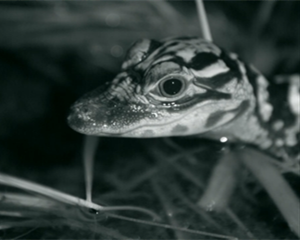Tucked away amongst the sawgrass, alligator nests have been incubating eggs for two months now.
在锯齿草丛中,鳄鱼蛋已经在巢穴里孵化两个月了。
They're built around the roots of small trees which anchor them as water levels rise.
巢穴就建在小树的根部周围,当水位上升时小树就会将巢穴固定住。
A female guards each one, patiently waiting for her young to emerge.
雌性鳄鱼会守护每只蛋,耐心地等待着鳄鱼宝宝的诞生。
And by August, the first babies have hatched.
到了8月,第一批幼崽已经孵化。
At just a week old, they are perfectly camouflaged.
它们在一周大的时候,就已经伪装得很完美了。
Bright yellow stripes make them invisible among the dried grasses the nest is built around.
明亮的黄色条纹使它们能够完美地隐藏在鳄鱼巢穴附近的干草丛中。
At this age, they spend their days close together in pods under the gaze of their watchful mother.
这个年龄的它们只能在妈妈警觉的注视下挤在一起度日。

Only eight inches long, they're defenseless, an easy meal for a passing bird or a hungry male alligator.
它们的身长只有八英寸(约20厘米),毫无防御能力,是路过的鸟儿或者饥饿的雄性鳄鱼的小餐。
But when darkness falls, these hatchlings show a different side.
然而,当夜幕降临时,这些刚孵化出来的小鳄鱼就会展现出它们不同的一面。
With fewer predators around, the youngsters take on a new confidence.
随着周围捕食者的减少,小鳄鱼们重获信心。
They break away from their pods and set out alone.
它们脱离了自己的群体独自出发了。
And while they might look cute, even at this tender age they already have the instinct to hunt.
虽然看起来很可爱,但是它们在这个幼小的年龄已经有了捕猎的本能。
Their mother will protect them but she won't feed them, so they have to get the hang of it fast.
它们的母亲虽然会保护它们,但是不会给它们喂食,所以它们必须尽快掌握捕食的本领。
They hunt all through the night,
它们整夜都在捕食,
pouncing on their prey of tiny insects and fish with not quite expert precision just yet.
扑向它们瞄准的小昆虫和小鱼,虽然还不是很熟练。
They'll perfect these skills over the next year until they're big enough to go it alone.
它们会在接下来的一年里完善这些技能,直到自己长得足够大、能够独立完成捕食。


